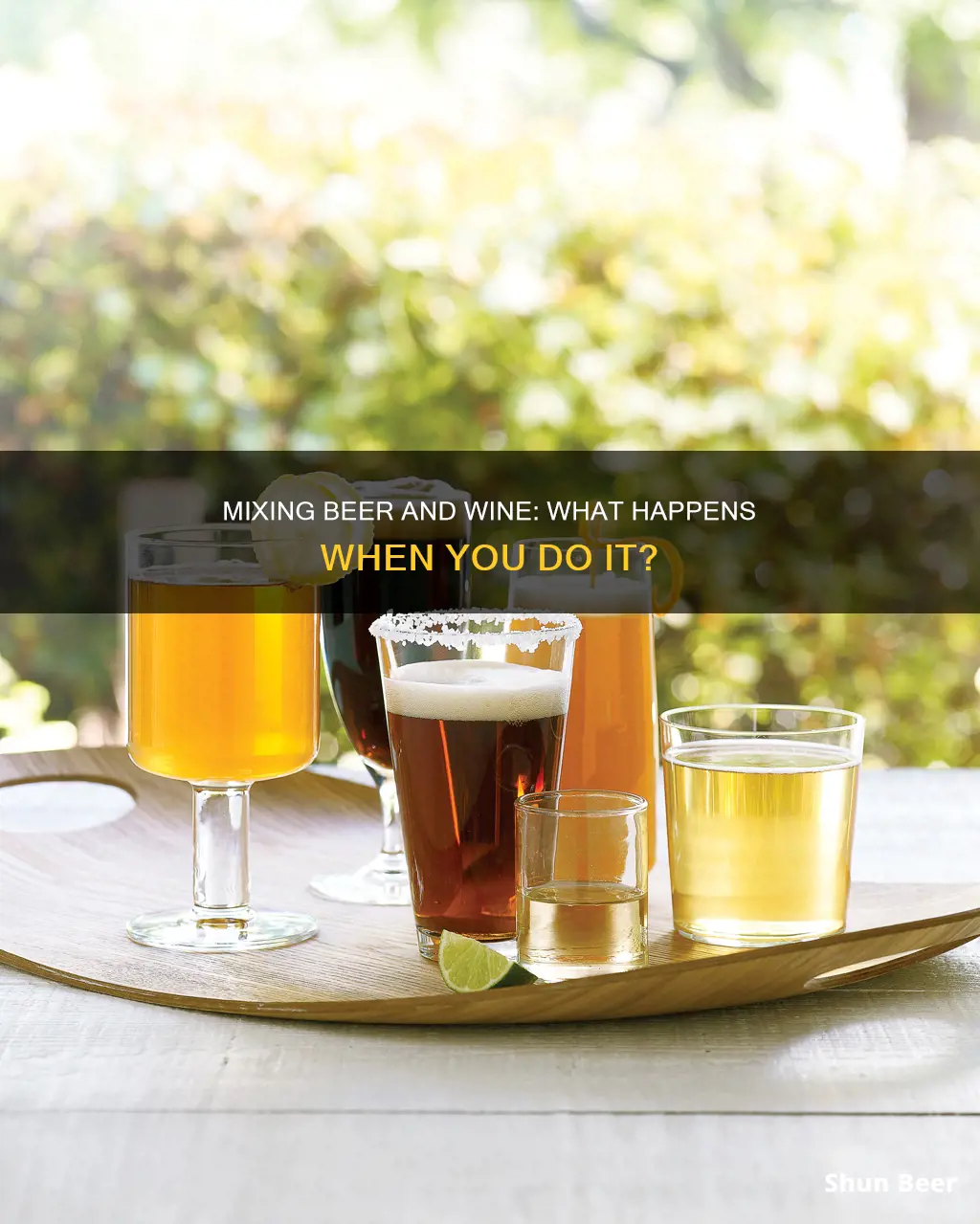
There is a long-standing belief that drinking beer after red wine will make you feel unwell. The saying goes: beer before wine and you'll feel fine; wine before beer and you'll feel queer. However, a study by researchers at Witten/Herdecke University in Germany and the University of Cambridge in the UK set out to test this theory. The study involved 90 participants who were split into three groups and given different combinations of beer and wine. The results showed that the order of drinks did not affect the severity of hangovers. So, while drinking beer after red wine may not make you feel worse, drinking too much alcohol of any kind is likely to result in a hangover.
| Characteristics | Values |
|---|---|
| Order of drinks | No effect on hangover intensity |
| Hangover causes | Dehydration, immune response, metabolism and hormone disturbances, drinking too much |
| Hangover predictors | Vomiting, perceived drunkenness |
What You'll Learn

Beer before wine, you'll be fine; wine before beer, you'll be queer
The saying "beer before wine and you'll be fine; wine before beer and you'll be queer" is a well-known adage that provides guidance on drinking beer and wine in succession. While it is a catchy rhyme, the truth behind it is more nuanced and subject to individual experiences and cultural contexts.
The adage suggests that drinking beer before wine will result in a more pleasant experience, while starting with wine and then switching to beer may lead to unpleasant consequences, often interpreted as a more severe hangover. This saying has been passed down through generations and is deeply ingrained in drinking culture across various countries. However, it is important to note that individual tolerance, drinking rates, and other factors also play a role in how one might feel after mixing these drinks.
There are several theories that attempt to explain the logic behind the saying. One theory suggests that starting with beer, which is typically consumed in larger quantities due to its lower alcohol content, will slow down your drinking pace. As a result, when you switch to wine, you are less likely to consume it as quickly as you would if you started with it, potentially reducing the overall amount of alcohol consumed. Conversely, starting with wine and then switching to beer may impair your judgment, leading to faster consumption and increased intoxication.
Another theory relates to the carbonation present in beer. It is believed that drinking a carbonated beverage, such as beer, after consuming a non-carbonated drink like wine, can stimulate the pyloric sphincter muscle in the stomach, causing it to open and releasing both drinks into the intestine. This can result in faster absorption of alcohol and potentially more intense effects. However, it is important to note that individual physiology and other factors also play a role in alcohol absorption and metabolism.
While the saying provides a fun rhyme to remember, scientific studies have questioned its validity. A study conducted by British and German researchers involved 90 volunteers who drank beer and wine in different orders under controlled conditions. The results, published in the American Journal of Clinical Nutrition, showed that the order of drinks had no significant impact on the intensity of hangovers. Kai Hensel, a senior clinical fellow at Cambridge University, concluded, "We debunked the saying, it's not true. You're going to be the same whatever order you drink these beverages in."
In conclusion, while the saying "beer before wine and you'll be fine; wine before beer and you'll be queer" has persisted through the years, scientific evidence suggests that drink order may not be the primary determinant of hangover severity. Individual differences, drinking rates, and overall alcohol consumption are more crucial factors in managing hangovers and the negative effects of mixing beer and wine. As always, it is important to drink responsibly and pay attention to your body's responses to different types and amounts of alcohol.
Alcohol-free beer: A safe drink for liver disease patients?
You may want to see also

The amount of alcohol, not the order, causes a hangover
There is a popular saying that goes, "beer before wine, and you'll feel fine; wine before beer and you'll feel queer". However, this has been debunked by scientists who conducted a study on 90 volunteers aged 19 to 40. The volunteers were split into three groups, with the first group drinking about two and a half pints of lager followed by four large glasses of white wine, the second group having the same drinks but in reverse order, and the third group consuming only beer or wine. The participants were monitored throughout the session and were asked about their drunkenness before bed and their hangover intensity the next morning. The results showed that the order of drinks had no impact on the hangover intensity, debunking the popular saying.
The truth is that hangovers are primarily caused by drinking too much alcohol, regardless of the type of drink. The more alcohol a person consumes, the worse the hangover is likely to be. This is because alcohol causes dehydration, electrolyte imbalances, gastrointestinal irritation, inflammation, and mini-withdrawal effects, all of which contribute to the typical symptoms of a hangover, such as fatigue, thirst, headache, nausea, and stomach pain.
In addition, other factors can also influence hangover severity. For example, drinks with higher levels of congeners, which are compounds that contribute to the taste and smell of alcoholic beverages, can worsen hangover symptoms. Darker spirits, such as bourbon, tend to have higher levels of congeners than clear spirits. Sulfites, which are added to wine as preservatives, can also cause headaches in people who are sensitive to them.
Therefore, the key to avoiding a hangover is to drink in moderation or choose non-alcoholic beverages. Drinking water or sports drinks can help prevent dehydration, and eating before or after drinking can slow alcohol absorption and maintain blood sugar levels. However, the only surefire way to avoid a hangover is to abstain from alcohol altogether.
Beer and Flu Medication: A Safe Mix?
You may want to see also

Women tend to have worse hangovers than men
While the old adage goes, "beer before wine, you'll feel fine; wine before beer, you're in for a queer [time]," research has shown that the order of drinks does not affect the intensity of a hangover. However, it is worth noting that this particular study did not include red wine.
Now, when it comes to gender differences in hangovers, the evidence is mixed. Some studies have found that women tend to experience worse hangovers than men, even when consuming smaller amounts of alcohol. Researchers at the University of Missouri-Columbia attribute this to women's lower body weight and lower percentages of total body water, which lead to higher degrees of intoxication and more intense hangovers per unit of alcohol. Additionally, men have alcohol dehydrogenases in their stomachs, which are enzymes that aid in metabolizing alcohol more quickly.
On the other hand, other studies that controlled for factors like height, weight, and ethnicity did not find significant differences between men and women in terms of hangover severity. It appears that while factors like height and weight do play a role in hangover intensity, the impact of gender is less clear.
According to British nutritionist Amanda Ursell, women tend to be more affected by alcohol due to their higher percentage of body fat and lower body water content. This results in alcohol being distributed and dissolved in a smaller amount of water, leading to more pronounced effects. Furthermore, Ursell notes that women's smaller organs, including the liver, may also contribute to their increased susceptibility to hangovers.
Is Drinking Old Beer Safe?
You may want to see also

Vomiting and drunkenness are associated with a heavier hangover
Vomiting and drunkenness are indeed associated with a heavier hangover. Hangovers are caused by drinking too much alcohol, and the severity of the hangover is influenced by how drunk you get and whether you vomit. The more intoxicated you feel, the worse the hangover will be. Vomiting is a red flag that you will experience a more intense hangover.
Hangovers are characterised by a set of unpleasant symptoms that occur after drinking too much alcohol. These symptoms include fatigue, weakness, thirst, headaches, muscle aches, nausea, stomach pain, vertigo, sensitivity to light and sound, anxiety, irritability, sweating, and increased blood pressure. The severity of these symptoms depends on how much you drank and for how long. However, individual health and other factors also play a role. Some people experience a hangover after just one drink, while others who drink heavily may not experience any symptoms at all.
The cause of hangovers can be attributed to several factors related to the direct effects of alcohol consumption. Firstly, dehydration is a significant factor. Alcohol is a diuretic, causing increased urination and fluid loss. This dehydration leads to thirst, fatigue, and headaches. Secondly, electrolyte imbalances occur due to the excessive urination disrupting the balance of essential chemicals in the body. Thirdly, gastrointestinal irritation occurs as alcohol irritates the lining of the stomach and intestines, slowing digestion and increasing fatty substances in liver, stomach, and pancreas secretions, resulting in an upset stomach and nausea.
Additionally, alcohol increases inflammation throughout the body, contributing to the general unwell feeling associated with a hangover. It also causes a mini-withdrawal effect, leading to increased restlessness and anxiety once the positive effects wear off. Furthermore, the body's metabolism of alcohol produces acetaldehyde, a toxic byproduct that contributes to inflammation in various organs and can cause a fast pulse, sweating, and nausea.
While the order of drinks (beer before wine or vice versa) has been a subject of debate, scientific research has debunked the saying "beer before wine, and you'll feel fine; wine before beer, and you'll feel queer." A study published in the American Journal of Clinical Nutrition found that the order of drinks had no impact on "hangover intensity." The truth is that drinking too much of any alcoholic beverage is likely to result in a hangover, and the key predictor of hangover severity is how drunk you feel and whether you experience vomiting or sickness.
Beer and Augmentin: Safe Mix?
You may want to see also

There are no effective remedies for a hangover
While drinking beer after red wine won't make a hangover worse, there are unfortunately no effective remedies for a hangover. The only way to avoid a hangover is to not drink alcohol. However, there are some things you can do to relieve the symptoms of a hangover.
Drinking water can help to relieve some of the symptoms of a hangover, such as a dry mouth and headache, as alcohol is a diuretic, which means it makes you pee more and lose a lot of liquid. It is also important to drink water before you go to bed after drinking alcohol, as this will curb the effects of the alcohol the next morning.
Drinking coffee or tea can also help with the grogginess of a hangover, as caffeine is a stimulant. However, caffeine should not be mixed with alcohol, as it can mask the effects of alcohol, making drinkers feel more alert than they are.
Eating a good breakfast can help to maintain steady blood sugar levels, as low blood sugar levels are often associated with a hangover. Eating foods that are high in carbohydrates, such as toast, bagels, bread, and crackers, can help to relieve nausea, a common symptom of a hangover.
Taking a pain reliever can also help to ease the symptoms of a hangover, such as a headache. However, it is important to avoid pain relievers that contain acetaminophen, such as Tylenol, as these can damage the liver if taken while there is still alcohol in the system.
Finally, getting plenty of sleep can help to alleviate the symptoms of a hangover, as alcohol can cause sleep disturbances and is associated with decreased sleep quality and duration.
Understanding the Basics of Draft Beer Systems
You may want to see also
Frequently asked questions
Yes, you can drink beer after red wine. However, drinking too much alcohol will likely result in a hangover.
Research has shown that the order of drinks does not matter when it comes to hangovers. Drinking beer before wine or vice versa will not affect the intensity of your hangover.
There are several sayings about the order of drinking beer and wine, such as "beer before wine and you'll feel fine; wine before beer and you'll feel queer" or "liquor before beer, you're in the clear; beer before liquor, never been sicker." However, these sayings have been proven to be untrue by scientific studies.
The severity of a hangover is influenced by factors such as dehydration, immune response, metabolism, hormones, and ingredients other than pure alcohol content. Vomiting and perceived drunkenness are also associated with heavier hangovers.







